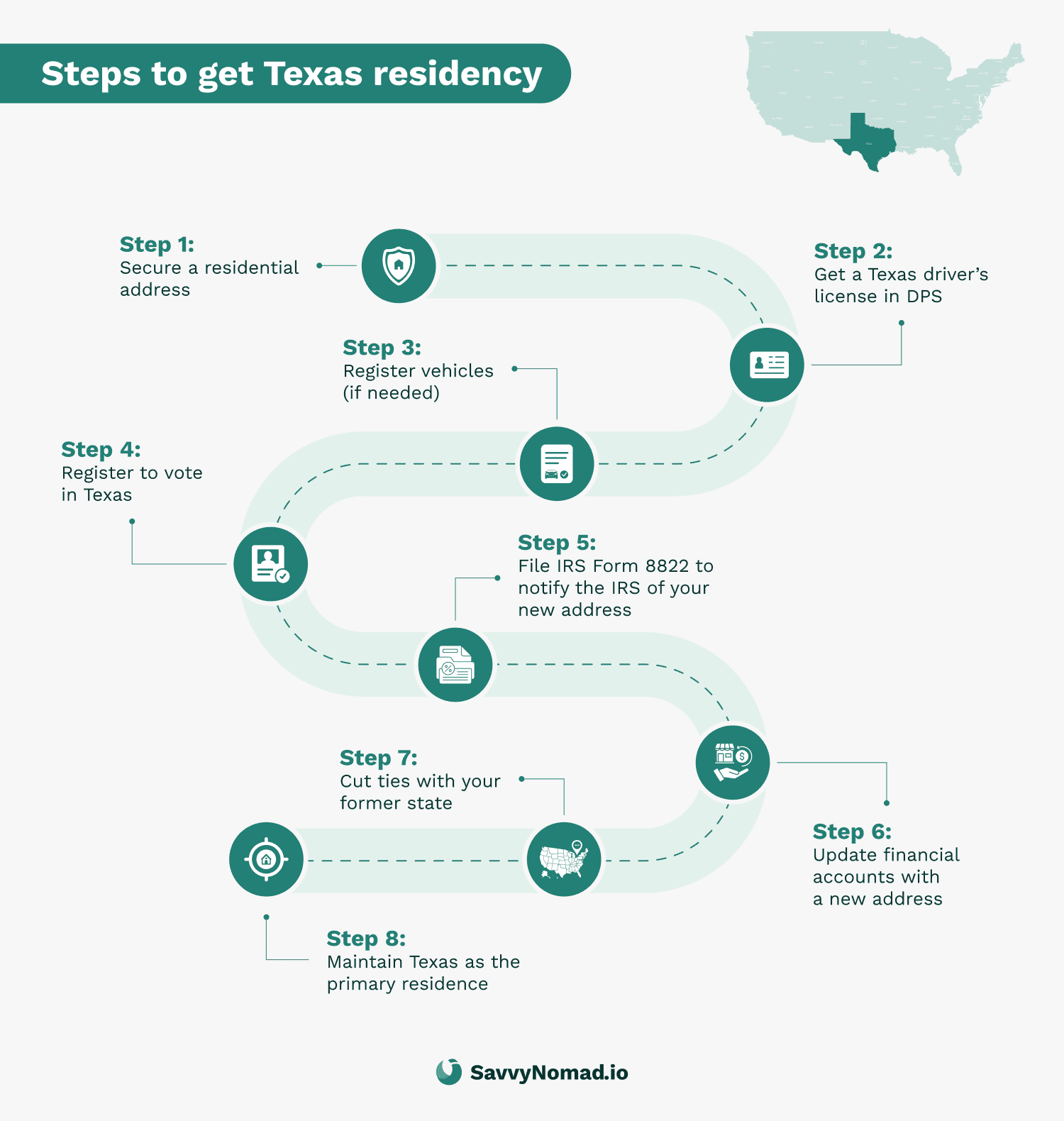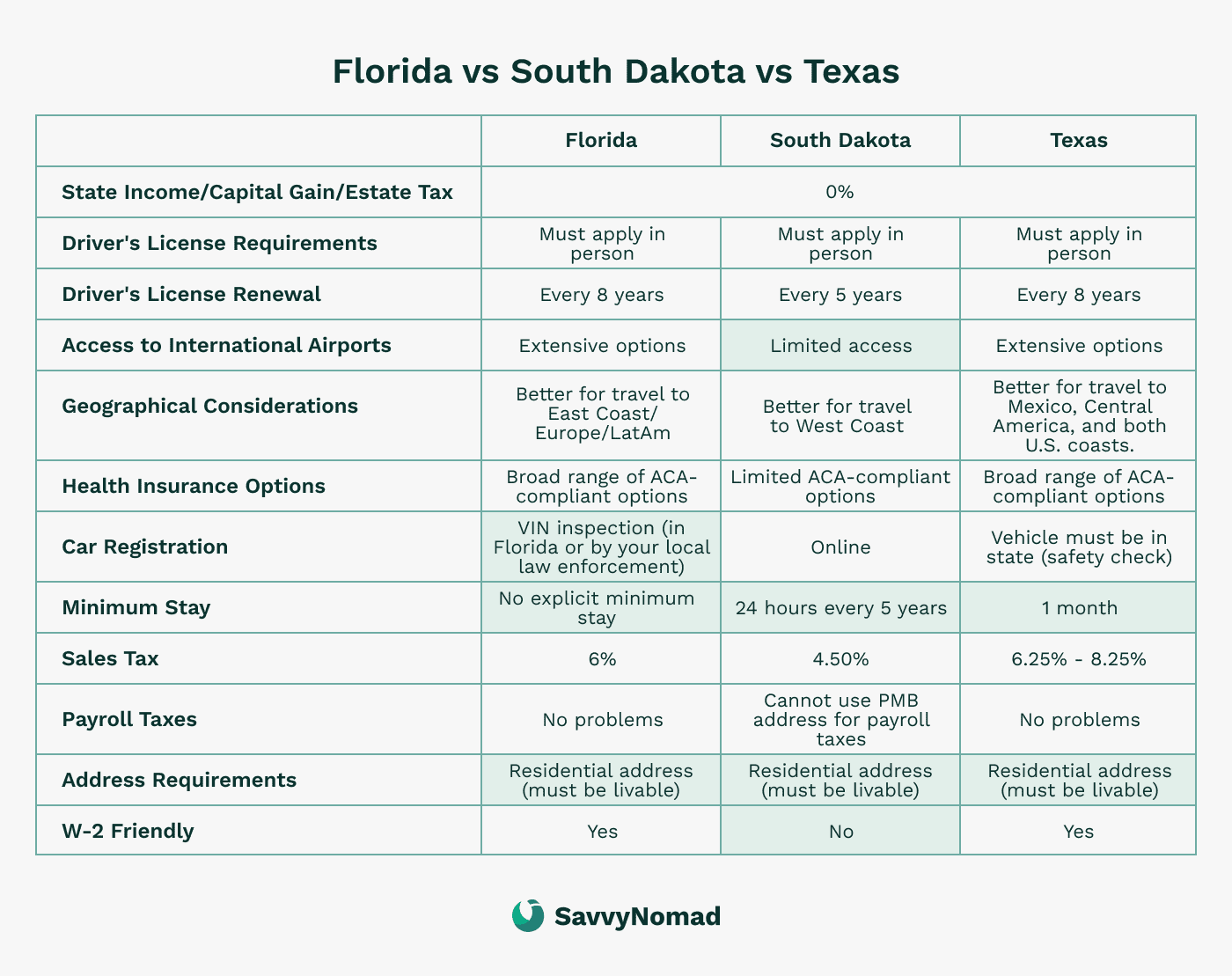Texas Residency: Benefits and Requirements

Hey there! Thinking about making Texas your new home sweet home? You're not alone! This big-hearted state isn't just about cowboy hats and barbecue – it's a hotspot for folks who live life on the go, like digital nomads, world travelers, and rockstar remote workers.
Why?
Because Texas is more than just friendly faces; it's got some serious perks for your wallet and peace of mind, too.
In this guide, we'll dive into what it means to call Texas your official stomping ground, all the cool stuff you get from it, and how to make it happen. And hey, we'll even do a little side-by-side with some other popular spots like Florida and South Dakota so you get the full picture.

Ready to find out why having a home base in Texas could be your next great move?
Let's roll!
What is Domicile, and why is it important?
Think of Texas as your trusty home base, the place where you hang your hat, even if you're off globetrotting or thriving in your work-from-anywhere job. It's not just about where you crash at night – it's about having a spot that the law recognizes as your own 'piece of' Texas turf.
Domicile is like your home field and, for our purposes here, Texas is the one we're rooting for. It's your permanent spot, the place you're tied to no matter where you jet off to.
Domicile state vs. Legal residence
If ‘domicile state' is your official home field, 'legal residence' is more like your temporary crash pad. This difference is important because it determines where, if at all, you must pay state taxes.
Tax implications
Taxes? In Texas, you can forget about state income tax. This is a big deal, especially if you're a high-earner.
Eligibility for state services
Even if you’re not always in Texas, being a legal resident means you’re still a member of the community, participating in both the responsibilities and benefits of being a Texas resident.
A court appointed legal guardian can significantly affect a minor's residency eligibility, particularly for tuition purposes and access to state services, by establishing the minor's domicile in Texas.
Legal rights and obligations
Your domicile state determines many of the rules you need to adhere to when it comes to all things legal. For example, upon death, Texas would be the state executing your will, which has a big effect when it comes to things like estate taxes.
Getting the lowdown on what makes Texas your home base is key to taking full advantage of what this unique state offers. Understanding this stuff means you can make smart decisions and enjoy the full Texas experience, even if you're not putting boots on the ground all that often.
Benefits of establishing domicile in Texas
Hey, globe-trotters and high-flyers! Thinking about where to plant your roots while you conquer the world from your laptop? Let's talk about why Texas is the new 'it' place for savvy nomads and world citizens.
Here are the key benefits of making Texas your domicile:
Tax perks? Yeehaw!
How does keeping your hard-earned money sound? In Texas, there's no chunk of your income heading off to the state, which means more dough for your adventures or your piggy bank.
By eliminating state and local income taxes, depending on where you are currently domiciled, you could save over 20% of your annual income.
• No corporate income tax
Running your empire from a hammock or a high-rise? Well, Texas won't ask for a slice of your corporate pie either. More profits stay with you, the boss.
• No estate or inheritance tax
Got a treasure chest of assets? Pass it on to your descendants without the state dipping in. In Texas, what's yours stays in the family, no estate or inheritance taxes in sight.
• Lower sales tax
Even when you're stocking up on gear for your next escapade, the sales tax won't make your wallet weep. It's a bit kinder here, meaning more savings on the stuff you need.
• No capital gains tax
And for the money maestros, Texas plays it cool with your investments — no capital gains tax to worry about, so your savings grows at the highest rate possible.
Flexibility
• Ease of establishing residency
Establishing Texas residency is crucial for college admissions and eligibility for resident tuition rates, and Texas rolls out the welcome mat with a residency setup that’s almost as easy as ordering your favorite takeout online.
• Cost efficiency
From getting your paperwork to keeping your car legally on the road, Texas is all about keeping the costs down. That means more cash for living it up or tucking away for the future.

Texas residency requirements
Ready to hang your hat in Texas?
Here's the lowdown on locking in your Lone Star status.
1. Legal prerequisites:
- Intent to Establish Domicile: Prove you're not just here for the brisket. Get a Texas driver's license, register to vote, update your address to something in Texas to show you're serious and join a local church or synagogue, find a local health or golf club, or find a local cause to volunteer for.
- Physical Presence: You've got to spend some real time in Texas. No specific number of days, but enough to get a feel for those wide-open skies.
2. Timeframe:
- General Timeframe: Generally, you should stick around for about a month before you declare yourself a true Texan.
- Exceptions: If you're swapping a valid out-of-state license for a Texas one, you might be able to skip the 30-day wait.
3. Required documentation:
- Proof of Residency: Bring on the paperwork! Think vehicle registration, Texas ID, utility bills, or a lease with your new Texas address.
- Additional Documentation: In some cases, you might need to show where you work, where you've studied, or where you pay taxes to prove Texas is your home state.
4. Special considerations for digital nomads and expats:
- Flexible Documentation: If your home office is wherever you open your laptop, Texas will work with you on what counts as proof of Texas residency.
- Online Processes: Renewing your vehicle registration or your driver's license? Texas has you covered with online services.
How to establish residency in Texas

1. Plan your stay
- Arrangement: Whether you're renting, buying, or going the trendy co-living route, get a place with your name on it in Texas.
- Documentation Preparation: Start putting together the ID, bank statements, and any other paperwork you'll need to show you're putting down roots in Texas.
- Timeline Planning: Texas wants you around for at least a month before you can say you're a local. Students, you've got a year-long date with Texas before you're official and can qualify for in-state tuition benefits.
2. Obtain a Texas address
- Secure a Physical Address: Lock down a place to call your own. Buy a little slice of Texas, or find a rental where you can hang up your 10-gallon hat.
- Update Your Mailing Address: Switch your mailing address pronto. The sooner you start getting mail with your name and Texas address, the better. It's solid proof for the residency checklist.
3. Gather necessary documentation
- Proof of Residency: Line up the usual suspects of paperwork: a voter registration card, your car's Texas registration, and proof you're insured to drive in the state.
- Additional Documentation: Sometimes you've got to show a bit more, like where you work, where you're paying taxes, or where you've been learning. Keep those docs handy too.
4. Department of Public Safety (DPS) visit
Head to the nearest Department of Public Safety office and apply for that Texas driver's license or ID card.
5. Register to vote
Show you're all in on Texas decisions by registering to vote. This is an important step to becoming a true Texan.
6. Vehicle registration (if applicable)
If you own a motorcycle, car, or boat, get it decked out with local plates.
7. File IRS Form 8822
This form officially notifies them of your change of address, ensuring consistency across your state and federal documentation. If a student is claimed as a dependent on their parent's federal income tax return, the parent must establish domicile in Texas for the student to gain residency status.
8. Update your address with relevant entities
Tell your bank, your job, and anyone else who sends you important mail that you should be reached at your new Texas address.
9. Maintain records
File away every piece of paper that proves you’re a Texas resident. You’ll want that paper trail neat and tidy. Maintaining proper records is crucial for individuals, including international students, to gain resident status by meeting specific criteria.
Maintaining Residency Status
Maintaining residency status in Texas is crucial to keep enjoying all the perks that come with being a Texas resident, like resident tuition rates and access to state services. Once you’ve gone through the process of establishing domicile in Texas, it’s important to keep up with a few key actions to ensure you stay compliant.
Actions to ensure compliance
To keep your Texas residency status in good standing, here’s what you need to do:
- Stay in Texas or Abroad: Make sure you continue to physically reside in Texas with the intent to maintain your domicile in Texas or stying full time abroad without spending more than 183 days in any other state.
- File Taxes: File your federal income tax returns as a Texas resident. This helps solidify your claim to Texas residency for tax purposes.
- Vote in Texas: Register to vote in Texas and participate in state and local elections. This shows you’re an active member of the community.
- Update Your Address: Keep your address updated with all relevant entities, like banks and employers, to reflect your Texas residency.
- Keep Records: Maintain records of your residency, including proof of domicile and employment. This can include utility bills, lease agreements, and employment contracts.
Long-term residency considerations
Living in Texas comes with some long-term benefits and responsibilities. Here’s what you need to know:
- State Services: As a Texas resident, you’re eligible for state services, including healthcare and education.
- Financial Aid: Texas residents may be eligible for state-funded financial aid and scholarships, which can be a big help if you’re planning to attend college.
- Vehicle Registration: You’ll need to register your vehicles in Texas and obtain a Texas driver’s license. This is part of showing your commitment to living in the state.
Residency Eligibility through High School Graduation
Graduating from a Texas high school is another pathway to establishing residency in the Lone Star State. This method is particularly beneficial for students and international students looking to claim residency.
Impact on residency status
Establishing residency through high school graduation can significantly impact your status:
- Resident Tuition Rates: You’ll be eligible for resident tuition rates at Texas public colleges and universities, which can save you a lot of money.
- Financial Aid: You may also qualify for state-funded financial aid and scholarships, making higher education more affordable.
- Voting: Once you establish residency, you’ll need to register to vote in Texas and participate in state and local elections, further integrating you into the community.
By following these steps and understanding the long-term implications, you can successfully establish and maintain your Texas residency, enjoying all the benefits that come with being a part of this vibrant state.
Comparison with Florida and South Dakota domiciles

When it comes to choosing a domicile for tax benefits, Texas, Florida, and South Dakota are often in the spotlight. Here's a side-by-side comparison to give you a clearer picture:
Tax benefits:
State income tax
All three states roll out the red carpet for your wallet by not dipping into your income. Whether you're a freelancer or running a corporation, you're off the hook for state income tax in Texas, Florida, and South Dakota.
Sales tax
- Texas starts with a 6.25% state sales tax. But depending on where you shop, local taxes might bump that number up a bit.
- Florida has a slightly lower state sales tax at 6%, but just like Texas, local areas could tack on extra.
- South Dakota boasts the lowest state sales tax of the trio at 4.5%, but again, local taxes could increase your checkout total.
Capital gain tax
If you're playing the long game with your investments, Texas, Florida, and South Dakota won't ask for more at tax time. Capital gains get the same no-state-tax treatment, with only federal taxes to consider.
Establishing residency:
General considerations
- Nomad-Friendly States: All three are a hit with roaming types like RVers and globe-trotting workers because they don't take a slice of your income in state income taxes.
- Common Steps: Whichever state you pick, you'll be looking at similar steps: snagging a local address, getting that state ID or driver's license, and ensuring your mail knows where to find you.
Texas
- Get a Texas address, apply for a Texas ID, and let the state know you'll vote here
- If you've got wheels, Texas wants to peek under the hood with a vehicle inspection. Yes, this means driving your car all the way to Texas.
Florida
- Florida's list looks a lot like Texas'—address, ID, voter registration.
- Registering your car here might be kinder to your bank account than in South Dakota, and you can skip the vehicle inspection. Instead, all you need is your VIN and a physical inspection by a local police officer in your current county. Considering that this could save you a road trip across the country, it's well worth it.

South Dakota
- South Dakota now requires that you first obtain a residential address in the state and then spend one night in a hotel or campground in the state before applying for a South Dakota driver's license. You'll need a receipt from the hotel or campground that displays your name, and the names of everyone in your family seeking to establish South Dakota residency, and your South Dakota address.
- The fees for vehicle registration are fair, and you won't have to worry about inspections or emissions tests, which means no road trips and no VIN inspections.
FAQs
What are options for proof of residency in Texas?
To provide proof of residency in Texas, individuals must present two printed documents that contain their name and residential address in Texas, with at least one document verifying that they have lived in Texas for at least 30 days.
Acceptable documents include:
- Current deed, mortgage, or residential rental/lease agreement.
- Valid Texas voter registration card.
- Texas motor vehicle registration or title.
- Texas concealed handgun license or license to carry.
- Utility or residential service bill dated within 180 days.
- Selective Service card.
- Homeowner's or renter's insurance policy.
- High school, college, or university report card.
- Preprinted tax forms, financial statements, or government agency documents.
- Military or Veteran's Administration documents indicating address.
- Medical bills, hunting/fishing licenses, pay stubs, etc.
How does establishing a domicile in Texas impact my federal and state tax obligations?
Establishing a domicile in Texas can reduce your state tax obligations (think no state income taxes) , but your federal tax obligations are unchanged.
Are there any benefits in Texas for remote workers or digital nomads in terms of services or infrastructure?
Texas is big on tech and has a welcoming vibe for remote workers. Think co-working spaces and tech meetups galore, plus a business-friendly atmosphere.
What are the implications for my voting rights if I choose Texas as my domicile?
Planting your flag in Texas means you get to vote in Texas. Remember to update your registration and note that you won't be voting back in your old stomping grounds.
How does Texas handle driver's licenses for those not physically present year-round?
Even part-timers can get a Texas driver's license. Just make sure you've got a legit residential Texas address and keep up with any special rules for renewals.
Can I maintain my Texas domicile if I'm abroad for an extended period?
For sure. Just make your intent to return to Texas clear, keep a local address, and stay on top of any legal and tax stuff. It wouldn't hurt to get some expert advice, either.
How often must I be in Texas to maintain my domicile status?
Well, Texas likes to see some commitment. Try to spend around half the year there, or at least get settled for 30 days. But really, it's about showing Texas is your true home state.
Are there any Texas-specific health insurance considerations for remote workers or digital nomads?
Health insurance can be tricky, so look for plans tailored to folks who might be working from a hammock one day and a coffee shop the next.





